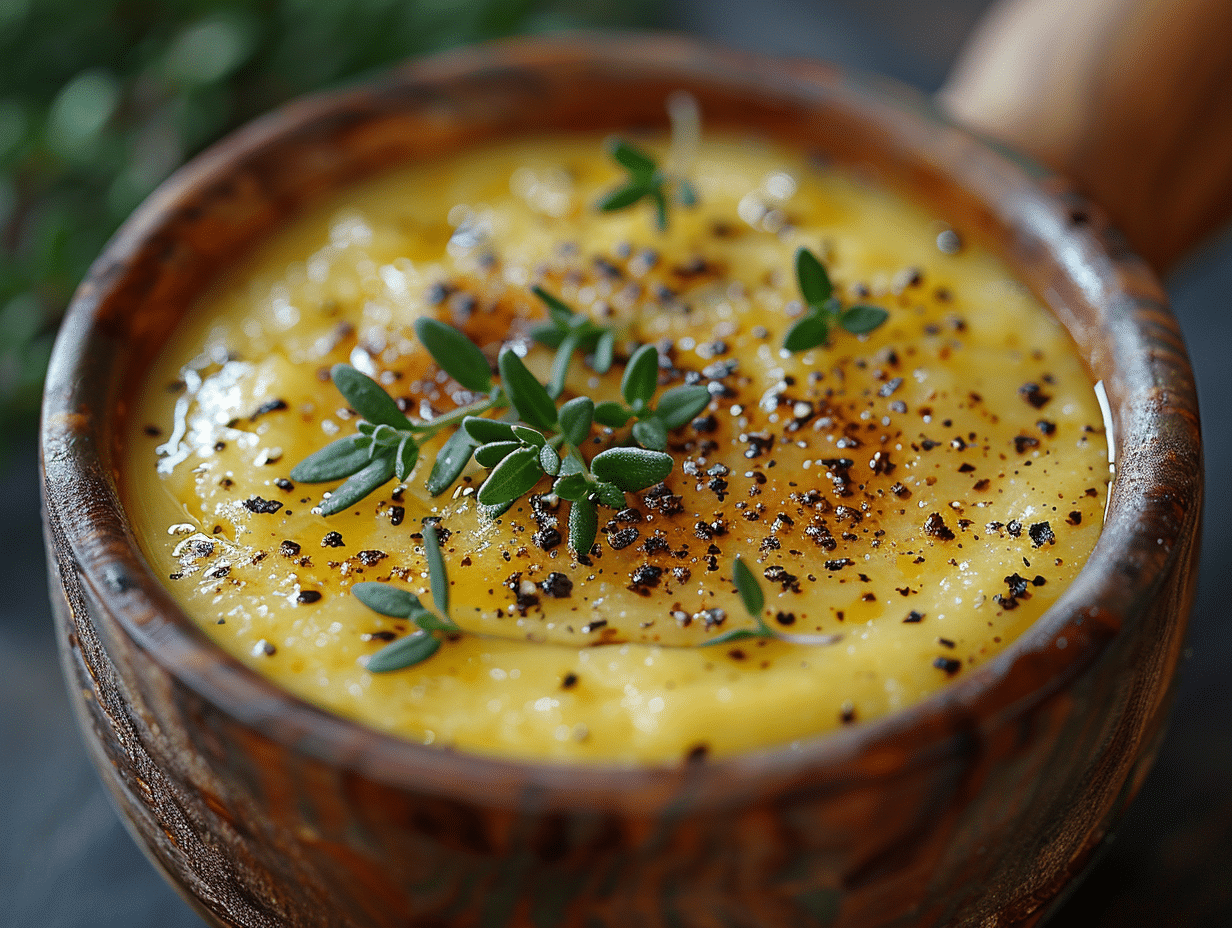Classic Velouté Sauce Recipe: Rich & Silky
Jump to Recipe
Do you know what it’s like to dip a spoon into a rich, silky sauce that makes you feel like you’re in a cozy Parisian bistro? Have you ever closed your eyes and couldn’t help but smile because the taste was just right? That’s what velouté sauce, a basic but classy French cooking ingredient, gives you.
Velouté sauce, one of the “mother sauces” in French cooking, serves as a foundation for numerous dishes. Imagine making a masterpiece that’s both rich and creamy with just three main ingredients: butter, flour, and delicious chicken stock. This traditional French sauce is essential to me because it makes my meals feel both cozy and fancy.
This classic recipe takes less than 10 minutes to make, from the time you start preparing it to the time you finish stirring it. It’s perfect for a quick but delicious meal. This velouté sauce recipe makes a delicious meal for two people and is beneficial for you because it has only 85 calories per serving and a balance of nutrients that supports a healthy lifestyle. Let’s start making this delicious sauce that will make any dish taste better. Velouté’s ease and beauty can change the way you cook, just like it has for generations of chefs. Get ready to learn how to make classic French sauces the right way!

Velouté Sauce: An Introduction
When it comes to French cooking, velouté sauce stands out because of its smooth texture and mild flavor. The word “velour” in French means “velvet,” and this classic sauce’s smooth, classy finish lives up to its name. Its versatility is due to its simplicity, which makes it an important part of cooking.
What’s Different About Velouté Sauce?
You can mix velouté with different herbs, spices, and other flavorings to enhance its taste, making it unique. Because it tastes mild and has a smooth texture, it is an important sauce in French cooking. Mixing the butter, flour, and stock gives the base a rich texture that complements other foods.
Velouté Sauce’s History
Velouté sauce has a long and intriguing culinary history that goes back hundreds of years. Traditional French kitchens refined and perfected this sauce, which has remained a classic due to its elegance and versatility. The sauce not only captures the essence of classic French cooking, but it also gives chefs the building blocks to make many other sauces based on it.
Getting your ingredients together
It’s important to get the best French cooking ingredients before starting the velouté sauce recipe. How well your dish turns out depends a lot on how tasty and fresh the ingredients are.
First, let’s look at the basic things you’ll need to make this delicious food. These are the most important things you need to make a fantastic sauce.
Key Ingredients
- Clear Stock: Chicken, veal, or fish stock forms the sauce’s body. Ensure it’s well-made and clear to bring depth to the flavor profile.
- Unsalted Butter: Use unsalted butter for better control over the seasoning. It contributes to the velvety texture that velouté sauce is renowned for.
- All-Purpose Flour: This is a thickening agent that, when combined with butter, creates a roux integral to the sauce preparation process.
Optional Add-Ins
Once you’ve mastered the base of the velouté sauce recipe, feel free to experiment with optional ingredients. They can add layers of complexity and cater to personal tastes.
- Cream: Adding cream can make the sauce richer and more luxurious.
- Wine: Incorporating a splash of wine can introduce a slight acidity and depth.
- Fresh herbs: Think fresh thyme, parsley, or tarragon. These can enrich the sauce with aromatic flavors.
High-quality French cooking ingredients are the secret to mastering this classic sauce. Happy cooking!

Getting the Roux ready
To make a perfect velouté sauce, you need to get proficient at making the roux. This simple step is an important part of French cooking that makes sure your sauce thickens beautifully. No matter how experienced you are as a chef or how much you love cooking at home, making the Roux can be simple if you follow these tips.
Making the Roux
You need the same amount of unsalted butter and all-purpose flour. Put 4 tablespoons of butter in a medium-sized saucepan and melt it over medium-low heat. Once melted, slowly whisk in 4 tablespoons of all-purpose flour. The goal is to make a smooth, lump-free mixture that looks like wet sand. This mix is a common way to make sauces thicker, and it’s the basis for many classic French dishes.
Cooking the Roux
After combining the flour and butter, gradually heat the roux. To keep it from burning, keep the saucepan on medium heat and stir it all the time. It will be ready when the roux turns a pale, light blonde color. This should only take two to three minutes. This eliminates the taste of raw flour and imparts the roux with the smooth, silky texture essential for a quality velouté sauce. To excel at this step, you need to keep stirring and carefully control the heat.
Getting proficient at making roux sets you up for a rich, velvety velouté sauce that goes well with a lot of different dishes made with traditional French methods.
Adding the Stock
After making the roux, add the stock. This important step makes our velouté sauce come to life. The key is to be careful and add stock little by little. Let’s talk about how to get the best consistency.
Gradually Incorporating Stock
Add a little warm stock to your roux at a time while stirring all the time. Keep stirring the mixture to make it even and stop lumps from forming. Before adding more, gradually incorporate each part of the stock into the roux to ensure full mixing.
Do this again, but this time keep the heat low. As you add more stock, it should mix in smoothly, turning your roux into a smooth sauce. To get a velvety texture, which is what a classic Velouté sauce is all about, you must keep stirring during this step.
Achieving the Right Consistency
It’s an art to get the sauce to the right consistency. The sauce is ready when it forms a light, creamy layer on the back of a spoon. To thin out the sauce, if it’s too thick, add small amounts of stock while stirring it. If it’s too thin, however, let it simmer longer to make it thicker.
For this to work, you need to be patient. You can keep the sauce’s smoothness and integrity by taking your time and adding the stock slowly. This careful method brings out the beauty of traditional French cooking, resulting in a smooth mix of tastes and textures.

Velouté Sauce
Ingredients
Method
- Prep the Ingredients: Measure out all ingredients and ensure the stock is warm but not boiling.
- Make the Roux: In a medium-sized saucepan, melt the butter over medium-low heat. Once melted, gradually whisk in the flour until it forms a smooth, lump-free mixture resembling wet sand.
- Cook the Roux: Continue to cook the roux, stirring constantly, until it turns a light, pale blonde color, which takes about 2-3 minutes.
- Add the Stock: Slowly pour in the warm stock, a little at a time, while continuously stirring to avoid lumps. Each addition of stock should be fully incorporated before adding more.
- Simmer the Sauce: Keep the mixture on low heat, stirring until the sauce reaches a smooth, velvety consistency. This should coat the back of a spoon lightly.
- Adjust Consistency: If the sauce is too thick, add more stock gradually. If too thin, simmer longer until the desired consistency is reached.
- Add Optional Ingredients: Stir in cream, wine, or herbs to enhance the flavor as desired.
- Serve: Once the desired consistency and flavor are achieved, serve the velouté sauce warm over your choice of dish.
Notes
- For the best results, use high-quality stock and fresh herbs.
- Velouté sauce is a base sauce that can be enhanced with various ingredients to create different flavors.
FAQ
What makes Velouté sauce unique?
Velouté sauce’s uniqueness lies in its simplicity and elegance. The sauce gets its name from the French word velour’, meaning velvet, which aptly describes its smooth texture. You can transform Velouté into various derivative sauces by adding herbs, spices, and other flavorings, making it versatile.
What are the key ingredients for a classic Velouté sauce?
The key ingredients for a classic velveté sauce include a clear stock (chicken, veal, or fish), unsalted butter, and all-purpose flour. High-quality stock is essential as it defines the sauce’s depth of flavor. Food Network’s cooking techniques emphasize the importance of quality ingredients in achieving the best results.
How do I make a roux for Velouté sauce?
To make a roux, gently cook equal parts flour and butter together. Aim for a light, blonde roux by stirring consistently and controlling the heat. This step is critical for providing the sauce with its characteristic silkiness, as explained in “Mastering the Art of French Cooking” by Julia Child.
How should I incorporate the stock into the roux?
Gradually add the stock to the roux to ensure a smooth consistency without lumps. Add each ladle of stock fully before incorporating more, and maintain a gentle simmer. Continuous stirring until the sauce thickens to the right consistency is crucial, a technique highlighted by the Culinary Institute of America’s “The Professional Chef.
What optional add-ins can enhance Velouté sauce?
Optional add-ins for Velouté sauce include cream, wine, and fresh herbs, which allow for richer flavors and personal customization. Karen Page’s “The Flavor Bible” suggests experimenting with these add-ins to create unique and personalized variations of the sauce.
What’s the history of Velouté sauce?
French culinary history has mastered and refined velouté sauce over centuries. Its mild flavor made it an ideal base for other sauces in French culinary history. Sources like “Cuisine and Culture: A History of Food and People” by Linda Civitello provide insights into its evolution.
What consistency should Velouté sauce have?
Velouté sauce should have a consistency that coats the back of a spoon with a light, creamy layer. Achieving this requires patience and gradual incorporation of stock while maintaining a gentle simmer, ensuring the sauce is smooth and velvety. Serious Eats’ Sauce Guide emphasizes the importance of consistency in sauce finishing.